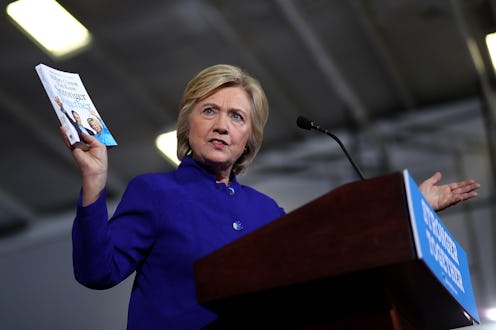News
3 Common Arguments Against Voting & How To Respond
The clock is ticking, with only 45 days until the general election, and it is no secret that the stakes are high. That may sound cliché, and to a degree, it is when politicians like California Gov. Jerry Brown say that "the stakes couldn't be higher." But this presidential election seems to offer even more polarized, disparate visions of the country's values and goals, which makes it even more important than ever for people to go to the polls. Many Americans don't, though. According to the Pew Research Center, U.S. voter turnout in 2012 was only 53.6 percent.
In particular, millennials have a reputation for not showing up to the polls. Pew also pointed out that millennials had the lowest voter turnout in 2012, with only 46 percent of eligible voters in this demographic saying they actually cast their ballots.
It's true that very legitimate campaign financing concerns, the Electoral College system, and gerrymandering can create a seemingly bleak landscape when it comes to the potential to influence election. It's easy to feel defeated and like a single vote doesn't matter, but it turns out your vote could have more of an impact than you realize.
These are three common reasons someone may argue that their vote doesn't matter, and these are three reasons they should vote. Take advantage of your right to vote and be a contributing member of a participatory electorate.
1. I Live In A Very Red/Blue State; My Vote Doesn't Matter
It can be discouraging to voters who live in an typically conservative or liberal state and personally vote the opposite, but the popular vote can still have an impact. For one thing, strong showings for third-party candidates can garner national support for the outsider candidate and pave the way for future elections.
For example, even though history is not on the side of the third-party candidate when it comes to winning the overall election, it can still sway public policy. Take Ross Perot’s presidential run in 1992. Perot made the budget deficit a priority in his campaign and gained a lot of support from voters, so much so that it influenced the administration of his opponent, Bill Clinton, when he went on to become president. “By the time Bill Clinton was elected that fall, if he had not done something about the deficit he would have been in big trouble and that was largely Ross Perot’s doing," historian Michael Beschloss told PBS.
2. I Don't Love Any Of The Candidates
Even if none of the candidates are what you dreamed of, inevitably, someone will win, whether or not you like him or her. It is a privilege to vote. From my perspective, taking it for granted is, frankly, sinful. Even in 2016, there are still many disenfranchised voting communities — not to mention the relatively recent past when many groups were still fighting to get the right to vote in the first place. You don't have to be in love with a candidate to exercise your voting right.
3. The Election System Is Rigged Anyway
A popular sentiment this election season is that the system is "rigged." Republican presidential candidate Donald Trump certainly makes this claim a lot.There's no argument against the fact that the American electoral system isn't perfect, but sticking your head in the sand about it will only contribute to the status quo.
If you don't vote now, don't complain about it later.
Images: Bustle/Alyssa Foote (2)
